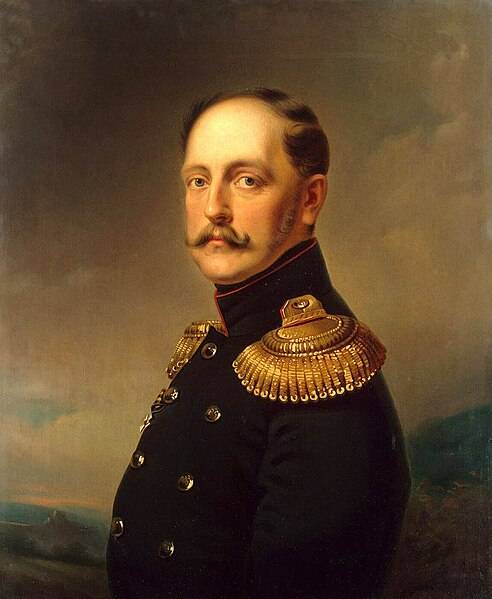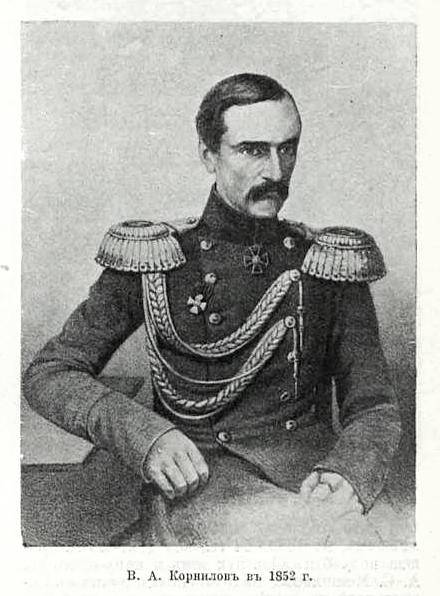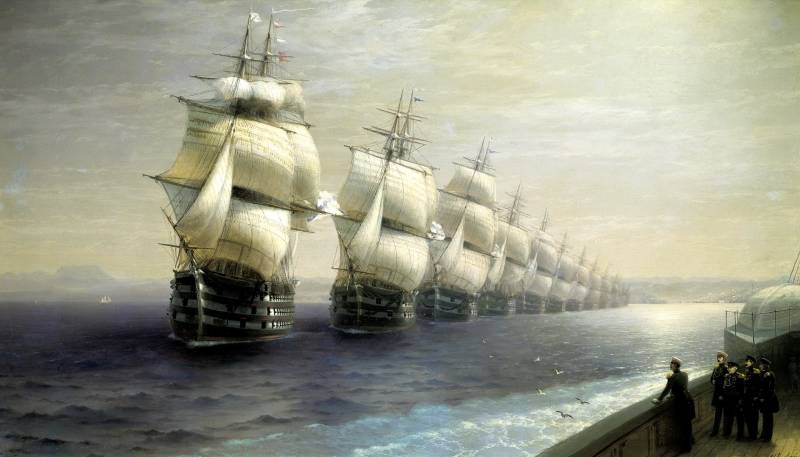“The Black Sea Fleet will defend the strait against any enemy fleet”
War has become inevitable
After the failure of Prince Menshikov’s mission, Tsar Nikolai Pavlovich, in order not to lose face, could only use force (How Nikolaev Russia fell into the trap of the Crimean War). In St. Petersburg they believed that this would be another Russian-Turkish war, tete-a-tete, without outsiders, in which Russia had complete advantage, both on land and at sea. As a last resort, France could enter the war, but we did not have common borders, and the French could provide limited assistance to the Ottoman Empire.
With England, as was believed in the Russian capital, we had no controversial issues. Austria and Prussia were considered our reliable partners. St. Petersburg especially believed in the benevolent neutrality of the Austrian Empire, which we saved in 1849 from the Hungarian Revolution. The collapse of these hopes became one of the main reasons for Russia's defeat in the Crimean (Eastern) War. The Foreign Ministry's pre-war diplomacy in Western Europe turned out to be an almost complete failure.
As shows story, the Western world is at any moment ready to forget the good deeds that Russia and the Russians have done - saving Europe from Napoleon or Hitler, saving the USA from the invasion of England and France in 1863, the sacrifices of the Russians to save Paris in 1914, etc. People's memory is short , and politicians act based on the short-term and long-term interests of their countries or unions. Huge Russia was always feared, Russians were considered “barbarians”, “Scythians”. We must always remember this so as not to complain later that we were deceived again.

Portrait of Emperor Nicholas I. Hood. Egor (Georg) Botman
Bosphorus operation
At the end of December 1852, Emperor Nicholas sketched out a plan for the “Bosphorus Operation”. He correctly noted that “The more striking, unexpected and decisively we strike, the sooner we will put an end to the struggle. But any slowness and indecision will give the Turks time to come to their senses, prepare for defense, and probably the French will have time to intervene in the matter either with a fleet, or even with troops, and most likely, by sending officers whom the Turks need. So, quick preparations, possible secrecy and decisive action are necessary for success.”
Thus, the Russian sovereign showed the key to success in the confrontation with Turkey, and possibly France. It was a quick and decisive operation while the enemy was not ready. Russian blitzkrieg. A strong expedition with the help of a fleet to the Bosphorus and Constantinople-Constantinople could quickly decide everything in favor of Russia.
The operation could involve the 13th Infantry Division (12 battalions with 34 guns) with loading in Sevastopol, the 12th Infantry Division in Odessa (the same forces). The divisions, with the help of ships of the Black Sea Fleet, landed in the Bosporus and captured Constantinople. The capital of the Ottoman Empire, the “think tank” where the empire’s key communications were located. Russia seized the strategic initiative and forced the Turkish government to begin peace negotiations, or to gather troops in the European part of Turkey (exposing the front on the Danube) and wait for help from the European powers. At the same time, Russian troops and navy could continue the operation and occupy the Dardanelles, preventing the same French from quickly coming to the aid of the Ottomans.
In February 1853, the chief of staff of the Black Sea Fleet and ports, Kornilov, submitted to the War Ministry a complete calculation for the transportation of landing forces. On March 19, 1853, Kornilov provided a memorandum to the head of the Naval Ministry, Grand Duke Konstantin Nikolaevich. In it, he noted that the Turkish fleet (5 battleships, 7 frigates, several corvettes and steamships) is hardly capable of going to sea to confront our fleet, but can defend the Bosphorus in the form of floating batteries. The future Battle of Sinop showed that Kornilov was right - the Russian fleet was significantly superior to the Ottoman one. The Bosphorus fortifications, although they have been updated, are still “easily passable.”
Kornilov concluded that,
“having occupied the Dardanelles fortifications by landing at a favorable point, for example, in Yalova-Liman or against the Greek village of Maidos, and having a division on the Hellespont Peninsula, the Black Sea Fleet will defend the strait against any enemy fleet.”
The success of the operation was determined by complete secrecy and surprise for the enemy. To deceive the Turks, Kornilov proposed declaring such an operation impossible and demonstrating the preparation of a landing on Varna or Burgas.

Was the plan to capture Constantinople real?
Quite. Cheek brings success. The probability of capturing the Bosporus and Constantinople was more than 90%, the Dardanelles from 50 to 70%. A daring, sudden and decisive operation would demoralize the Turks. Perhaps it would force them to accept a peace beneficial to Russia. With the leaving of Russian troops and ships in the strait zone as a guarantor of peace.
There were all the conditions for such an operation.
Firstly, our fleet in terms of the level of training of commanders and sailors and their training was much higher than the Turkish one, which was going through hard times. We had talented and decisive naval commanders who could carry out such an operation - Nakhimov, Kornilov, Istomin.
Secondly, the Ottomans were not prepared for such a situation. They were preparing to fight in the Danube and the Caucasus.
It is interesting that even the failure of the Russian Bosphorus operation could no longer make the situation worse than it was in reality. We would have lost several ships, hundreds or thousands of soldiers and sailors, and retreated. The fleet still had to be sunk without a fight in Sevastopol when the enemy arrived there. The human losses on the Danube, where the outcome of the war, as it turned out, was not decided, were much higher.
But with the capture of the Bosporus, even without the Dardanelles, excellent opportunities opened up for Russia. It would be a strategic victory. Why?
First, the we ruled out an invasion of the British, French and Turks in the Black Sea and Crimea. The enemy could not break through to the Black Sea theater. Russia turned the sea into a Russian lake and could, with the help of the fleet, facilitate the offensive of the army on the Danube and Caucasus fronts, destroy Turkish ports in Anatolia. The Russian army could quite easily cross the Danube, the Balkan Mountains and reach the straits, to the aid of the advanced landing corps. Russia could easily have raised up the Romanians, Bulgarians and Serbs against the Turks, intimidating Austria with the threat of a Slavic uprising. Russian troops solved strategic problems in the Caucasus without any problems.
Second, the Russia could defend the Bosporus for many years without any problems. The Bosphorus and Constantinople would have become for us an analogue of the defense of Sevastopol in 1854–1855, but we held them. The fact is that The Bosphorus and Constantinople were easier for us to defend than Sevastopol. It's a matter of supply.
The weak point of the defense of Sevastopol was supply. There were almost no railways yet. Delivery of guns, ammunition, and supplies through Russia and Crimea turned out to be difficult, costly and slow. We could supply the troops and fleet in the Bosporus (and the Dardanelles, if they were successfully captured) by sea, through the ports of Odessa, Kherson, Nikolaev, Taganrog, Sevastopol, etc. Then, when they were occupied, we could use the Bulgarian ports.
We were also able to transfer reinforcements in time and strengthen the airborne corps with new regiments and divisions. Now we did not have to scatter troops and artillery along the entire coast from Odessa to Novorossiysk, and wait in alarm for the enemy landing. It was possible to concentrate efforts on the defense of the Bosphorus, or the entire strait zone.
At the same time, we would cover most of the initial needs of the army and navy from trophies. They would use the guns and supplies of the Ottoman fleet. Constantinople itself had everything! Guns and ammunition in the arsenals, provisions would be brought by the locals (almost half are Christians, Greeks). For new fortifications, it was possible to dismantle old fortresses and stone structures. Do not forget: from a third to half of the population of Constantinople and its suburbs were Christians, Greeks, Armenians, and Slavs. The appearance of the Russians would have caused them great enthusiasm. From them it was possible to recruit thousands of auxiliary militia fighters and construction and engineering battalions.
Third, the appearance of Russians in the Bosphorus and Constantinople would demoralize the Porte. She could have made peace immediately or soon. The Russians in Constantinople became an “atomic bomb” for the Ottoman Empire. This is the center of the empire, the main communications. Division of the empire into Asian and European parts. The supply lines to Turkish troops in Europe, which passed through the capital, were largely cut off.
Immediate uprising of Christian and Slavic peoples in the Balkans. Their sympathies were completely on the side of the Russian Tsar and our army. Russia could threaten the division of Turkey, the immediate separation of its European part, or simply do it. The Danube principalities, Bulgaria, Serbia became our protectorates.
Fourthly, the Russian army was not bound by the defense of the Black Sea coast and Crimea. Austria could not threaten Russia with a concentration of troops in the Danube theater. Vice versa, we could concentrate forces on the Danube, in Bulgaria and exert military-political pressure on Vienna. They say, violate friendly neutrality, and your “patchwork empire” will collapse.
Unfortunately, this magnificent plan was not implemented. Nicholas I again succumbed to the persuasion of the chancellor, Foreign Minister Nesselrode and a number of other elderly dignitaries who were afraid of disrupting “stability” in Europe. They say, we will be careful and remain “partners” of the European powers.
On June 8, 1853, Tsar Nicholas I ordered the Russian army to occupy the Danube principalities (Moldova and Wallachia) subordinate to the Sultan “as collateral until Turkey satisfies the fair demands of Russia.” In turn, the British government ordered the Mediterranean squadron to go to the Aegean Sea. On June 21 (July 3), 1853, Russian troops entered the Danube principalities. Russia fell into a trap that led to its defeat.

Information